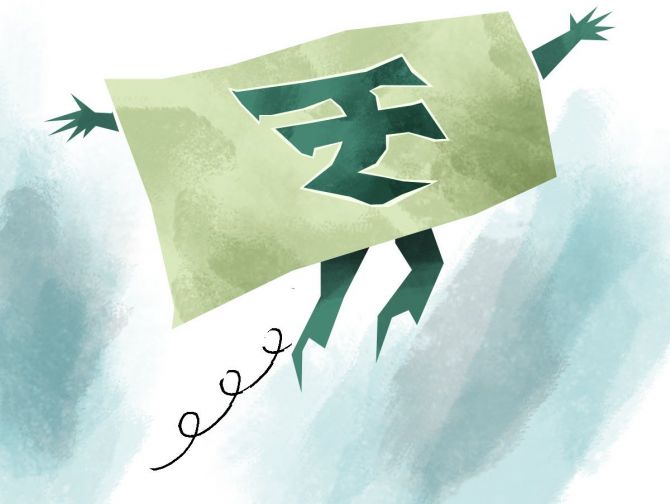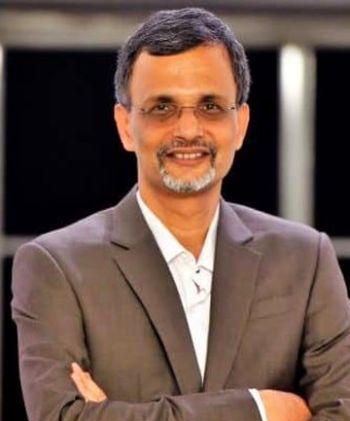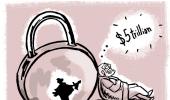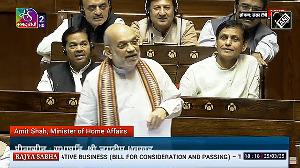'If you look at the order books of capital equipment companies or money deployed on the ground, there is forward movement in terms of actual investment by the private sector.'

The government believes that India's FY23 GDP growth will be between the Reserve Bank of India's forecast of 7.2 per cent and the International Monetary Fund's prediction of 7.4 per cent, Chief Economic Advisor V Anantha Nageswaran has said.
The slowdown in advanced economies is good for India on balance as the prices of oil and other commodities are cooling to ease domestic inflationary pressures, Nageswaran told Arup Roychoudhury/Business Standard.
The last monthly economic report stated that things are looking good for India with consumer confidence, private investment and touch service sectors all picking up. However, it also made it clear that geopolitical uncertainties still persist. So how do you see the rest of the year shaping up?
So as of now, from a macro standpoint, the demand for crude oil is coming down quite rapidly globally. And that's the reason why, even as we speak, Brent crude is just about $90 a barrel or below that.
I always maintain that while a global economic slowdown is not a great thing from the point of view of export prospects, but given India's energy import dependence, and the fact that a slowdown would eventually also influence the monetary tightening operations of the developed countries, etc, the balance of impact on the global slowdown would be good for India.
Geopolitics is something which we cannot predict.
There are always challenges and risks for any country at any given point in time. But I think so far, we have weathered the first six months of the conflict that is ongoing. And I think if we just continue to stay on track with whatever we have been doing in the last six months, we should achieve the kind of growth rates that are now anticipated for India by the Reserve Bank of India or by the International Monetary Fund.
So even though a number of agencies cut their FY23 GDP forecast for India after the Q1 numbers came out, you are still sticking to the RBI's forecast?
The government is still of the view that the RBI's forecast of 7.2 percent and the IMF's forecast of 7.4 percent, that is the range at which the final outcomes will come through. And I wouldn't even be personally surprised if it betters even these two estimates.

IMAGE: Chief Economic Advisor V Anantha Nageswaran.
Photograph: ANI Photo
India is very much integrated with the global economy. With the restrictions in China and a real threat of recession in the Western economies, do you see that impacting our trade and economic outlook?
The trade outlook will definitely be impacted. At the same time, the import bill, as a result of the lower crude oil price, will also become manageable.
Given the circumstances, I think global growth anyway was going to be impacted whether or not the central banks in the developed world tightened because the high inflation rate would have reduced consumer appetite and purchasing power.
And, and therefore, I feel the slowdown, on balance, would be a positive thing for India, given the kind of downward pressure it exerts on the crude oil and other commodity prices, industrial metals and food supplies in general.
The finance minister recently said that monetary policy is not the only tool to manage inflation, and that many factors which impact inflation are outside the remit of monetary policy. So does that mean we can expect some more measures on the fiscal side?
First of all, I am not going to second guess or re-interpret what the honourable finance minister said.
The government will always be looking at options depending on data, depending on developments. And I think what she was referring to is also the fact that the last six months the government has taken several fiscal measures such as lowering import duties, lowering excise duty, and also imposing conditions on exports of certain commodities, not just food items.
These are all the various supply measures that the government had taken. And that is what she refers to.
Given that bulk of the inflation acceleration happened with respect to food and energy commodities and so on, the government responded with various measures, fiscal and otherwise, and how things pan out from here would dictate future course of action. And it is difficult to go into the details right now.
India is gearing up to take over the G-20 presidency. One of the agenda items will be reforms in multilateral institutions like IMF and World Bank. How important is this agenda for India?
As G-20 president, India will be looking at these issues not just from the Indian angle, but from the considerations of the entire G-20 membership and beyond as well.
If you recall in 2018, I think it was the Eminent Persons group, which was constituted by the G-20 to look into various issues including the multilateral institutions' capital adequacy, governance framework, etc.
So in that sense, G-20 has been seized of this issue and it is a work in progress.
It is important in the current context of financing for climate change and energy transition, and also to be able to crowd in international private capital, etc.
A lot of the initiative and catalysing efforts have to come from the multilateral financial institutions, and therefore, it's imperative to take a look at their capital framework, and many other institutional arrangements that they have to make sure that they are able to play that catalysing role.
You mentioned climate finance. And we are hearing that in the second half of the year, we will be ready with a plan to issue green bonds as part of the government borrowing programme.
Has any thought been put into what kind of projects or what kind of end-uses will the money raised from these green bonds go for?
There are well-defined eligibility criteria, etc, that have been internationally laid out. And India isn't completely unfamiliar with green bonds.
The private sector has been issuing them, SEBI has guidelines, power sector corporations have issued green bonds, etc. So we will follow that. It will not be something new.
What is your view on private sector capex? Is it picking up strongly enough?
I think it's happening.
If you look at the order books of capital equipment companies or money that is deployed on the ground, and if you look at the sentiments being expressed by CEOs of firms, etc, definitely there is forward movement in terms of actual investment being put to work on the ground by the private sector.
And also you are beginning to see this in the growth of non-food credit. And the IPO processes are quite alive in the capital markets.
All of these things are signs that the private sector is actually looking past the the third wave and the ongoing energy uncertainties etc due to the conflict and beginning to invest. So, the signs are very encouraging.
Feature Presentation: Rajesh Alva/Rediff.com












 © 2025
© 2025